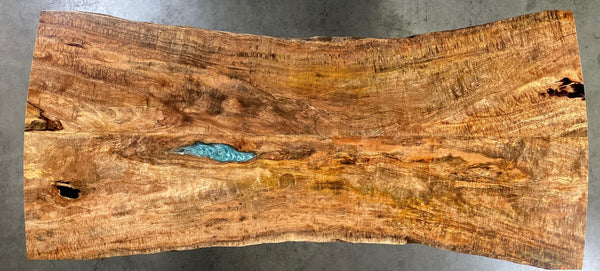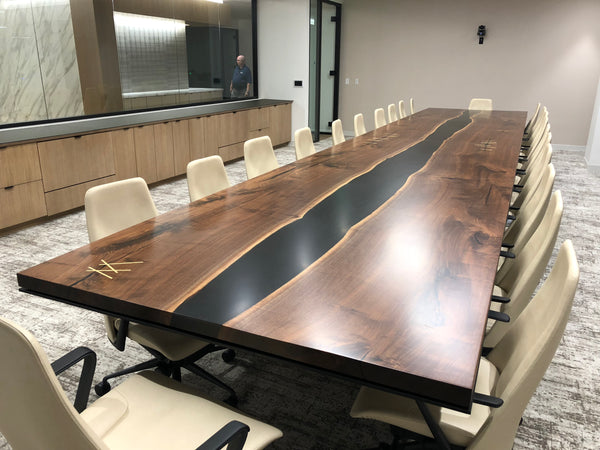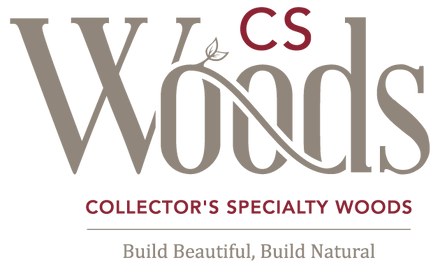
Woodworking and Epoxy Resin
When used in woodworking, epoxy resins help create more usable wood surfaces. It seals checking (cracks), knot holes, and other fissures and allows for a consistently level and sealed surface. Epoxy resins can also be used in larger amounts to create wide surface areas when paired with a wood selection that has more character. Much of our slab collection was selected for the sustainability of the wood itself, and the sustainability and eco-consciousness those slabs can bring to the woodworking process. We can help you choose wood with the amount of epoxy needed for your project in mind. We carry a wide variety of matched slabs perfect for river table pours, character pieces with more holes and checks ready to be artistically filled, and even some specialty woods like pecky cedar and various void prone species that are ready to be the centerpiece of your epoxy art project.
As the demand for sustainable and environmentally friendly materials continues to grow, many people are carefully looking at the impact of certain products on our planet. Projects that mix wood and epoxy resin are becoming increasingly popular, and the medium has a large following in the woodworking industry. These projects can be beautiful and functional, but we want to keep in mind that the use of epoxy resin has environmental impacts and thoughtfully limiting its use is essential as we move toward more eco-friendly understanding and materials.
Waterfall inverse river table being sanded in the CS Woods woodshop

Maple burl with epoxy resin pour in process.
When we sell our slabs for river-style tables and epoxy art pieces, we help our customers keep in mind that epoxy is not a budget choice. We can help by maximizing the wood to epoxy ratio as epoxy is more expensive than many of the slabs we have in stock, costing around $55 per board foot depending on what volume you purchase it in. We can help choose slabs that are best suited to satisfy a customer's desire for the mixed media look while minimizing the amount of epoxy required to create the piece.

Mango live edge bookmatched table top with blue epoxy accent. This piece is table top finished on both sides so that the epoxy accent can be on top, or the other side is clean and clear and epoxy can be on the bottom.
As a user and supplier of epoxy resin, it is important to us to understand the environmental impact of the product. The epoxy resin we sell in our showroom and use in our woodshop is made from soybeans, a bio-based renewable resource. It is a greener alternative product that still has the high-quality performance standards of traditional polyurethane epoxy resins. Using a more eco-friendly alternative has helped us reduce our reliance on non-renewable resources and decreased our products’ environmental impact. But, we always keep in mind that when compared to wood, all epoxy resins are not an environmentally friendly choice. We limit our own use of it at every opportunity and are careful about reducing the amount when we can.
Once epoxy is cured and hardened it is completely inert and could be considered "environmentally safe", but, unlike wood, it is not biodegradable and won't ever “go away”. Epoxy resin is one of the most versatile materials in the world, with a wide range of uses, and it is an essential material in many industries, including the woodworking industry. Epoxy resin can be considered an environmentally friendly material only when compared to other less sustainable options. Its 100% solids, fully reactive formulations, durability, and low VOC emissions contribute to its eco-friendly nature.
Regardless of the project, when we use epoxy, a polyethylene, it is accumulating in the environment. Over time, all epoxy resin undergoes a natural light oxidation process, meaning the sun’s warmth and ultraviolet rays will fragment some of the C-H bonds in the polymer structure to release the additives and plasticizers from the polymer into the environment and generate greenhouse gasses. Epoxy resin naturally breaks down much faster than wood, seriously limiting the lifespan of a surface made with high amounts of it. When wood, a carbon trapping, biodegradable and replenishable resource is paired in a mixed media project with epoxy, we limit the environmental and eco-friendly benefits of it.

One of the epoxy supplies shelves at the CS Woods Denver
open warehouse and showroom.
Epoxy resin is carefully manufactured through the process of polymerization, making it a type of plastic, and like all plastics, it's a long chain polymer. Epoxy resin is epoxy monomer, what you connect together to get the polymer. When you add an agent to polymerize epoxy resin (a liquid) it turns into epoxy plastic (a solid). Epoxy used in wood furniture is one of the densest plastic materials that you might have in your home.
It is important to practice safe disposal of epoxy resin in order to minimize its impact on the environment. Conventional methods for epoxy recycling are energy-intensive and involve toxic chemicals, making them unsustainable. So make sure to not let it go to waste! If you have leftover epoxy resin, use it for other projects! Consider using it for creative applications such as epoxy resin jewelry, coasters, bookmarks, or other small projects. Epoxy resin needs to go through certified chemical waste disposal, so if you have leftover or expired epoxy resin that cannot be repurposed, take it to a certified dump that handles chemical waste to ensure proper and environmentally responsible disposal.
Be cautious when working with epoxy resin near water sources to avoid any accidental spills as it can harm aquatic life. Handle it with care! Don't wash your epoxy resin down the drain and be sure to prevent spills into waterways.
As the world moves towards embracing more sustainable solutions, we want to help our woodworking customers and our furniture clients be informed about the choices they make! We are excited to share our passion for wood, and the ways that it can be used. Let us help you choose the best slab for your project while keeping the costs down, the sustainability up and holding the beauty and functionality in the highest regard.

